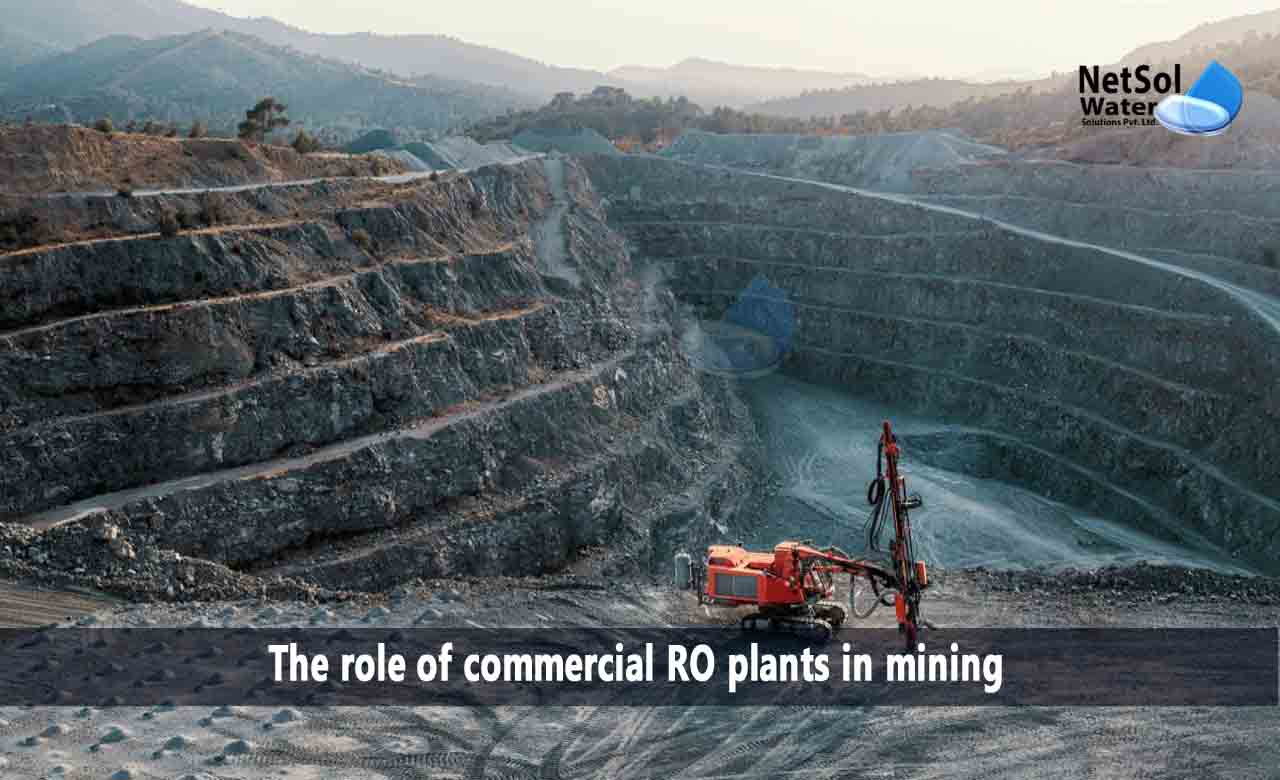What is the role of commercial RO plants in mining?
The mining industry requires large volumes of water for various processes, including ore processing, dust suppression, and equipment cooling. However, the water used in mining operations often contains impurities and contaminants that need to be effectively treated before reuse or discharge. Commercial reverse osmosis (RO) plants have emerged as a valuable technology for advancing water treatment in the mining industry.
We will see now the role of commercial RO plants in mining, highlighting their benefits, applications, and considerations.
Water Treatment Challenges in the Mining Industry
Some challenges in water treatment that are faced in mining industry are:
1- Water Scarcity:
The mining industry operates in various regions, including areas with limited water resources. Water scarcity poses a significant challenge, as it necessitates efficient water management and the reuse of process water.
2- Contaminant Removal:
Water used in mining operations often contains suspended solids, heavy metals, dissolved minerals, and other contaminants. These impurities can be detrimental to the environment and human health if not properly treated before discharge or reuse.
Role of Commercial RO Plants in Mining
Some of the roles of commercial RO plants in mining are as follows:
1- Water Reuse and Conservation:
Commercial RO plants play a crucial role in water reuse and conservation in the mining industry. By purifying and treating the water, RO plants allow for the reuse of process water, reducing the overall water demand and mitigating the environmental impact.
2- Contaminant Removal and Compliance:
Commercial RO plants effectively remove contaminants from mining wastewater, ensuring compliance with environmental regulations and discharge standards. RO technology removes suspended solids, heavy metals, and dissolved minerals, producing water of high quality that meets the required standards.
3- Efficient Resource Management:
RO plants enable efficient resource management in mining operations. By treating and recycling water, these plants reduce the need for freshwater intake, minimize wastewater discharge, and enhance sustainability in the industry.
Considerations and Implementation
Some of considerations and implementations that we can take are as follows:
1- Water Quality Analysis:
Before implementing a commercial RO plant, thorough water quality analysis is necessary to understand the specific contaminants present in the mining wastewater. This analysis guides the design and configuration of the RO system, ensuring its effectiveness in removing target impurities.
2- Pre-Treatment Processes:
Mining wastewater often requires pre-treatment to remove suspended solids, oils, and other organic matter that may foul or damage the RO membranes. Pre-treatment processes such as sedimentation, filtration, and chemical coagulation are commonly employed to optimize the performance and longevity of the RO system.
3- System Design and Scalability:
The design of a commercial RO plant for mining applications should consider factors such as the water demand, flow rates, and the required treated water quality. The system should be scalable to accommodate variations in water volume and composition during different stages of mining operations.
Benefits and Challenges
Some of benefits and challenges that can be faced are as follows:
Benefits:
Commercial RO plants offer numerous benefits in the mining industry, including water reuse, compliance with regulations, improved resource efficiency, and reduced environmental impact. The treated water can be used for various purposes, such as dust suppression, ore processing, and equipment cooling.
Challenges:
Implementing commercial RO plants in the mining industry may involve challenges related to the complexity of water chemistry, high salinity, scaling and fouling potential, and operational costs. However, with proper design, pre-treatment, and maintenance, these challenges can be effectively managed.
Summary:
Commercial reverse osmosis plants have become instrumental in advancing water treatment in the mining industry. By treating and purifying mining wastewater, these plants support water reuse, compliance with regulations, and efficient resource management. Through careful consideration of water quality, pre-treatment processes, system design, and scalability, commercial RO plants can effectively address water treatment challenges in the mining industry. By adopting this technology, mining operations can enhance their environmental stewardship, conserve water resources, and contribute to sustainable practices in the industry.
Leading manufacturer of sewage treatment plants in India.
Netsol Water is the leading manufacturer, supplier, and exporter of a quality selection of water treatment, and wastewater treatment products in India, by using advanced sewage treatment methods.
RO plants, water softeners, ETPs, STPs, DM plants, AMC, O&M, Ultra filtration, UV, Ozonation, ZLD plants, Anoxic tanks, and other goods and services are available from us. We also provide services to businesses in sectors including automotive, pharmaceutical, textile, pulp & paper, beverages, refineries, schools, hospitals, office buildings, and hotels, among others.
Netsol Water is Greater Noida-based leading water & wastewater treatment plant manufacturer. We are industry's most demanding company based on client review and work quality. We are known as best commercial RO plant manufacturers, industrial RO plant manufacturer, sewage treatment plant manufacturer, Water Softener Plant Manufacturers and effluent treatment plant manufacturers. Apart from this 24x7 customer support is our USP. Call on +91-9650608473, or write us at enquiry@netsolwater.com for any support, inquiry or product-purchase related query.



